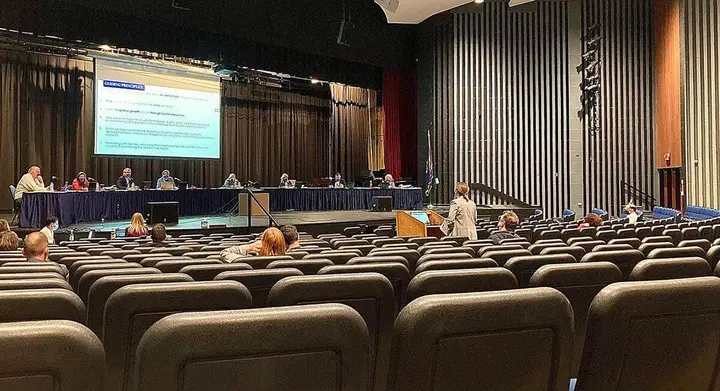Allotted speaking times remain unchanged at BOE meeting; board hears update regarding ‘Responsive Classroom’ approach

The October 21 board of education meeting, a nearly four-hour affair of about 20 in-person residents, covered mainly the structure of board meetings themselves, with much emphasis placed on the public participation portion of meetings and the communications that surround them.
The meeting commenced with a recognition of R.A.P week (an acronym for Recovery, Awareness, and Prevention). Hosted by the Northport-East Northport Drug and Alcohol Task Force, R.A.P week is an annual event within the Northport-East Northport school district designed to spread “the word about substance abuse and important preventative measures.” In a show of solidarity with the organization and its cause, all board members wore purple masks, the recovery and awareness movement’s official color.
The board then heard a presentation from Dr. Dana Boshnack, assistant superintendent for teaching and learning, regarding the Responsive Classroom teaching approach that an increasing number of K-8 educators throughout the district have begun to implement. As described at www.responsiveclassroom.org, the strategy is “a student-centered, social and emotional learning approach to teaching and discipline. It consists of a set of research, and evidence-based practices designed to create safe, joyful, and engaging classrooms and school communities for both students and teachers.”
According to data presented at the meeting, 92% of K-8 educators within the district of Northport-East Northport are four-day trained in the philosophies and practices of Responsive Classroom. Stephanie Campbell, a certified Responsive Classroom teacher and elementary teacher coordinator at Ocean Avenue Elementary School, said her experience with the program helps children “build confidence, ask questions, and take risks.”
The approach, as the board noted, has been widely studied by exemplary institutions, with two examples being the University of Virginia’s Curry School of Education and Columbia University’s Teachers College. The strategy is recognized by the Collaborative for Academic, Social, and Emotional Learning (CASEL), which awarded the Responsive Classroom organization their highest designation as a CASEL Select Program.
A fundamental activity surrounding the entire program of Responsive Classroom is that of the “morning meeting,” a group interaction of “students and teachers who gather together in a circle for twenty to thirty minutes and interact with one another.” During this activity, games can be played and stories can be shared, all within the context of a furthering of the social-emotional skills and wellbeing of those most susceptible to trauma and bullying – the students. The BOE expressed approval and excitement regarding this newly implemented approach.
After the presentation, the Policy Committee brought to the board suggested changes to policies regarding committees, agendas, procedures and minutes, with most of the conversation devoted to public participation at board meetings, including a proposed change to public comment speaking times.
The proposal would have shortened the time allotted for individual speakers from the current five minutes to three “uninterrupted” minutes; in the event a speaker was interrupted during his or her allotted three minutes, a board member or the superintendent could have adjusted the time forward accordingly.
Board member David Badanes, immediately after the discussion began, stated to the audience that the board was “not trying to stifle speech” but rather increase individual speaking times by factoring in interruptions. Correctly anticipating resident criticism, President Larry Licopoli soon acknowledged that most boards limit public participation to only 30 minutes of the allotted meeting and emphasized his commitment to ensuring that in the Northport-East Northport district, there was an equal opportunity for all to speak their conscience.
Soon after, Vice President Victoria Buscareno voiced her opinion in favor of maintaining the already allotted five minutes, of which, slowly, the board began to accept. As the debate ceased, the board ultimately voted in favor of keeping individual speaking time to five minutes; adding that no speaker can be interrupted by an audience member or trustee on the dais, and that all questions and factual corrections would be regarded after the speaker has indicated he/she is done talking. The board also agreed that meeting agendas will be available to the public three days prior to a scheduled BOE meeting, as has been the case in the past. A caveat does allow for agenda items to be posted no later than one calendar day before the meeting, if necessary.
The board’s recommended changes to the policy revisions as presented during the meeting will be made and put forth for a second reading at a future meeting, at which time the board may again make any changes to the proposed policy, decline to move the policy forward or adopt it as is.
Don’t miss a story
Get the latest news delivered to your inbox.








